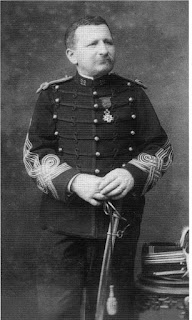Saturday 3 April 2021
Colonel Péchot and modern issues
We listened with interest to the debate between EU Central purchasing and the NHS. The big debate is whether the Astra-Zeneca-Oxford COVID vaccine does more harm than good.This is typical of British people our age. To our minds, the side effects reported have been scanty in comparison with the benefits of having been vaccinated.
There are some vaccine sceptics on this side of the Channel but more on the other. Relatively few French people have been vaccinated.
At the same time, France has put the blame on vaccine manufacturers. ‘They have’ so the story goes, ‘exported the precious doses to Britain and deprived their own folk.’ Mmm. It is more complicated than that.
Interestingly, there are echoes of what happened in the late 19th century. In order to redress what they saw as an imbalance, there was talk of commandeering the vaccines produced in their territory.
Between 1992 and 1888, a feud with certain similarities raged between two branches of the French Army. It was not vaccines at stake but national security. On one side were ranged the forces of the French Génie, their Sapppers. On the other were the French Artillerie, supporting one of their own, Prosper Péchot (pictured above just before he retired. For the full story, you can read ‘Colonel Péchot: Tracks To The Trenches’.
The problem was ‘What if France were dragged into a war? How would all the supplies necessary for a modern army be dragged overland?’
The Sappers proposed to commandeer the rail, wagons and locomotives of the substantial metre gauge net-works being built in France. If these were relaid, they could supply the Army. The young Péchot proposed a special design of prefabricated 60cm (two foot) gauge track. It could be quickly laid on indifferent country lanes. A special design of wagon could go over this track, laden with every sort of supply from fresh water to large calibre guns. The picture below shows the special military locomotive which was designed soon after. Péchot was encouraged by Paul Decauville, specialist in industrial prefabricated railways. He knew what he what he was talking about but was naïve enough to cost his proposal.
Something somewhat similar happened in 2020. The enemy was not a foreign army but a minute virus. Short-term resistance to the threat was provided by locking down whole economies. Resistance long-term depended on finding an effective vaccine.
In both the 19th and 21st century, genuine innovation was going to be needed.
The theory of vaccination has been around for centuries. Dead or weakened pathogens were used to stimulate an immune response. The challenge in 2020 was to develop messenger RNA technology to trigger the response. The body itself produces the viral proteins needed to respond to the intruder. The virus was new and the technology was new. As with innovative military transport, potential costs were enormous.
Enter the modern Péchot and Decauville. Roughly speaking, Professor Sarah Gilbert of the Oxford Jenner Institure, Pascal Soriot of Astra Zeneca and BioNTech researchers correspond to Péchot. In the 19th century, Péchot used his squaddies to create and refine his innovative transport system. In the 21st, Jenner and BioNTech used their labs. They needed backing.
Kate Bingham was more a financier but had some experience in speculative therapies. Her strategy was to ensure that these teams could work on several research projects.
It was going to be expensive.
Britain backed these projects offered by Pfizer-BioNTech, Astra-Zeneca/Oxford University and others. It was too important just to ‘let the market decide’ which therapies to back, test and prepare for use. The British tax-payer helped out. A lot of dedicated work and considerable outlay meant that in December 2020, the first British pensioners were rolling up their sleeves to be injected.
The response from EU central purchasing is very like that of the 19th century Sappers. They decided to commandeer medicines from their native industries. The Pfizer-BioNTech jab is the workhorse of Europe’s faltering vaccination plan and is being manufactured in Belgium. Thus, they wanted to keep all the medicines for themselves - regardless of any existing contracts.
Copyright Malcolm Wright
As with the 19th century Sappers, this plan was faulty. After the EU threatened to limit vaccine exports to the UK, observers pointed out that a factory based in Snaith, Yorks was producing a key ingredient. The messenger RNA which enables the vaccine to work has to be coated with lipid nanoparticles. Otherwise, the life-saver becomes just another poison.
If one side were to commandeer resources, so could the other.
Problems also arose for the French Army. When th emotherland was under attack, they fell back on their plan to commandeer narrow gauge railway material so that they could supply the Western Front. Although the Péchot System was officially adopted by the French Army, very little was made. In 1914, the Army found itself in urgent need of thousands of kilometres of track, wagons etc and did some commandeering from the civilian world. The drawing above, by Malcolm Wright shows a narrow gauge wagon, Type A used on the Tramways of Tarn,which was commandeered from the protesting railway company.The picture below shows a former station of the Tramway, at Lavaur.
In a short time, all the stock had to be returned. The story is told in Tramways A Vapeur du Tarn.
The French Army scrabbled around for years playing catch-up. The Germans had watched the development of the Péchot System with interest and created their own version – same gauge, same design of wagon and at first almost the same design of locomotives. By the end of 1917, the French Army had, almost, caught up.
See also
www.research.ox.ac.uk
Jamie Nimmo ‘Welcome to Snaith’ article in Sunday Times Business 28th March
Colonel Péchot: Tracks To The Trenches Birse Press
Tramways A Vapeur Du Tarn Oakwood Publishing
Subscribe to:
Posts (Atom)




